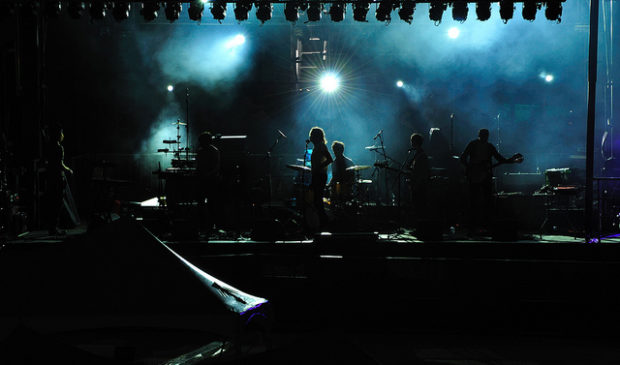Noise enforcement called key to new push for ‘agent of change’ ordinance
Tuesday, October 23, 2018 by
Chad Swiatecki The city is making another attempt to find peace and common ground between music and entertainment venues and high-rise hotels or residences as those two land uses becoming increasingly intermixed while Austin continues to grow. A resolution passed under consent at last week’s City Council meeting directs the city manager and staff to assemble the ordinance and rules necessary to manage and prevent noise disturbances that have caused friction for hotel guests downtown and present a concern in neighborhoods around the city.
The passage sees the city revisiting the so-called “agent of change” principle for the first time in more than a year. Its goal is to create a framework where the business that is the new arrival to an area would be responsible for either managing noise levels created or keeping nearby ambient noise from music from creating a disturbance for guests and residents.
The previous attempt stalled in late spring 2017 after concerns that the hotel industry hadn’t been included in crafting the proposed agreement, which many also felt lacked the legal “teeth” needed to regulate venues’ behavior and make hotels and residential development do their part.
A consortium of representatives for music venues, hotel groups and neighborhoods have spent the past year meeting occasionally to find consensus on the issue. Letters to Council from the Music Venue Alliance Austin and the Texas Hotel & Lodging Association point out the importance of consistent noise enforcement by the city in determining the success of the eventual agent of change ordinance, which is due in some form within 90 days.
The MVA letter lays out its proposed guidelines for how to manage music venues’ effects and find cooperation from other stakeholder groups.
“In order for (Austin Neighborhood Council), (Downtown Austin Alliance), and (Hotel & Lodging Association) to agree to these terms, we committed to asking for improvements to sound monitoring and violation enforcement. We believe it is the City’s duty to create fair and transparent guidelines, and to enforce them consistently.”
Members of the unofficial working group have said the issue with sound monitoring is that the Austin Police Department is the first option to receive complaints, but those calls aren’t treated as a priority. Some have suggested the city’s Development Services Department, the Music Division or a private contractor should be charged with monitoring and enforcing the city’s noise ordinance instead.
While downtown Austin’s concentration of music clubs, hotels and condo developments make it the most fertile ground for possible noise complaint issues, other areas such as West Sixth Street, East Riverside Drive and North Lamar Boulevard are areas of concern for stakeholders looking to find a solution between development and entertainment businesses.
Rick Carney, vice chair of the city’s Music Commission, said the final agent of change ordinance needs to clearly state the expectations for newcomer businesses. He expects the commission will consider a recommendation for city staff at its November meeting.
“Spelling out who is responsible and what their responsibility is, that’s the key thing because for a condo or hotel it will be more expensive to find a way to block the sound out than it might be for a club trying to keep their noise in,” he said, referencing previous disputes that saw a neighboring hotel help a nearby dance club buy a sound system that kept noise from leaving the premises.
“I’d like to see some teeth in the ordinance because we have to figure out a way to make it as fair as possible and still make it possible to conduct business.”
Another component of the MVA letter renews the push for the creation of a live music venue land use in city code, with the expectation that qualifying businesses would have an easier time qualifying for agent of change considerations.
That land use was suggested but left out of drafts of the recently abandoned CodeNEXT process to rewrite the city’s Land Development Code. With that plan scrapped, live music proponents are hopeful that the live music venue classification can be created as a separate policy item, removing one possible stumbling block from the process.
“It helps if you designate a place as a live music venue because you can apply the ‘who’s first?’ question and also apply things like parking considerations so neighbors know there may be a need for parking nearby,” said Dave Sullivan, a former member of the Planning Commission and a member of the city’s CodeNEXT advisory group.
“The other positive is this could turn into a two-step process, like what’s been done with the special events ordinance, where you get the ordinance first and then there’s a separate process for the rules, so there’s a second opportunity for you in case you weren’t happy with the first go at the ordinance.”
Photo by Mark Stevens made available through a Creative Commons license.
The Austin Monitor’s work is made possible by donations from the community. Though our reporting covers donors from time to time, we are careful to keep business and editorial efforts separate while maintaining transparency. A complete list of donors is available here, and our code of ethics is explained here.
You're a community leader
And we’re honored you look to us for serious, in-depth news. You know a strong community needs local and dedicated watchdog reporting. We’re here for you and that won’t change. Now will you take the powerful next step and support our nonprofit news organization?








